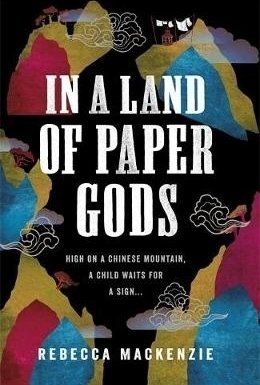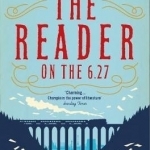
Hannah's High School Crush
Games and Education
App
Hannah wants to look gorgeous on the first date with her secret high school crush Jack! Get ready...

Runtastic Running & Fitness
Health & Fitness and Sports
App
We are #strongertogether! Join the worldwide community of fitness-minded folks (just like you!) who...
Hazel (1853 KP) rated In a Land of Paper Gods in Books
May 25, 2017
“My name is Henrietta S. Robertson. That’s my English name… My Chinese name is Ming-Mei.”
As the child of members of the Interior Alliance Mission, Henrietta has grown up between two cultures: English and Chinese. From the age of six she was sent to boarding school on a mountain in the Jiangxi Province, where four years later she remains as a small, pale, lonely girl.
For a girl as young as ten, Etta has a big imagination. She decides that God has called her to be a prophetess, and encourages the other girls in Dormitory A to join her in a Prophetess Club. This results is Etta getting into all sorts of trouble as she naively goes about inventing prophecies; all the while the Second Sino-Japanese War gets closer and closer to their mountain sanctuary.
Told mostly from Etta’s point of view, In a Land of Paper Gods is a hilarious historical novel about a young girl’s innocence. A large part of the story is about the missionary school rather than the ongoing war, therefore the focus is on Etta’s interpretation of the bible and her understanding of the differences between Western Christian and Chinese culture. However, once America joins the war effort, it is shockingly quick how the tale can go from humorous to heartbreaking.
The other character who plays a large part in this novel is Muriel, a dorm aunty, whom Etta regards highly. Muriel wanted to be a missionary but instead has found herself working at the Lushan school, keeping an eye on the ten and eleven year old girls. Although most of the book is written in Etta’s first person narrative, Rebecca Mackenzie has also included the occasional diary entry from Aunty Muriel. Since these are so few, it is not clear what their purpose is, as the story could easily continue without them.
Despite being an historical novel, In a Land of Paper Gods focuses less on fact and more on the impact the times had on a young girl. It is interesting to see the character development of Etta as she goes from a naughty, attention-seeking schoolgirl, to a young woman who must fend for herself. All the while she has her belief in God to resort to for explanations about the world she is living in. The reader also witnesses the growth of a relationship between Aunty Muriel and Etta. To begin with it is that of an adult and child, however it ends with them being equals in their suffering.
In a Land of Paper Gods is a pleasure to read. It is comically entertaining to begin with as the reader grows to love the characters, particularly mischievous Etta. It is hard to put the book down due to pure delight of the storyline, yet when the story turns darker it is just as difficult to put down, as we want to find out if the characters are going to be okay.
For some people, the Christian content will not mean anything, however it is possible to enjoy the novel without a religious background. For those, like myself, who do have a Christian upbringing, this aspect makes the story even better. Readers may recognize themselves or of their childhood in Etta, particularly her understanding of the bible.
Overall I loved this book. I was not sure what to expect, and have often found historical novels set in China to be rather dull. Therefore I was pleasantly surprised to discover how good this book was. I encourage others to read In a Land of Paper Gods, and I look forward to reading what Mackenzie writes next.
BankofMarquis (1832 KP) rated Rocketman (2019) in Movies
Jun 11, 2019
And...I would be wrong...for ROCKETMAN is a fun, fantastical fantasy musical depicting the rise and fall (by drug and alcohol abuse) of one of rock's most flamboyant showman of the 1970's.
Following the "Jukebox Musical" blueprint of something like JERSEY BOYS, Rocketman follows a young Reggie Dwight as he discovers his musical talent and grows into the Global Superstar known as Elton John.
I was happy that the filmmakers went this route (vs the bio-pic route that BOHEMIAN RHAPSODY went) for they were able to use the vast catalog of Elton John/Bernie Taupin tunes to their fullest advantage, when it made sense to drive the narrative forward - or to give the storytelling a shot of adrenaline.
This film had Elton John's blessings and he was not kind to a few people in his life - most notably his mother (an almost unrecognizable Bryce Dallas Howard in a strong turn), his father (Steve Mackintosh, who I had never seen before) and his Manager, John Reid (Game of Throne's Richard Madden). All 3 are pretty one-dimensional villains that help contribute to Elton's drug and alcohol abuse.
On the other side of the coin is his writing partner, Bernie Taupin (Jamie Bell, the original BILLY ELLIOT in a performance that I think is the best of his career) and his Grandmother, Ivy (good ol' Gemma Jones BRIDGET JONES DIARY and Madam Pomfrey in the Harry Potter films). Both of these characters are generally positive influences on Elton's life, trying to understand and support our hero on his journey.
As for our hero, Taran Egerton (the KINGSMAN films) embodies Elton with panache and zeal while showing an underlying shyness and insecurity that helps lead to his abuse issues. Egerton is EXCELLENT in this role - both in acting and singing. He doesn't so much imitate Elton John but embodies the essence of Sir Elton and his performance is quite effective. If Rami Malek deserved his Oscar for playing Freddy Mercury in BOHEMIAN RHAPSODY then Taran Egerton better be in the Oscar conversation this year.
The film was Directed by Dexter Fletcher (who was brought on to finish BOHEMIAN RHAPSODY once Bryan Singer was fired from that film for his on-set behavior), so he puts to good use his experience on the Queen movie, keeping the action moving fast, the characterizations simple (but satisfying) enough while showcasing just enough music to fill a "Best of" Album.
While BOHEMIAN RHAPSODY was a "meh" movie with a buffo ending (the recreation of the LIVE AID concert was amazing), ROCKETMAN suffers from just the opposite problem. Starting off strong and growing weaker until it ends in "meh" fashion. The fact that this film musical fantasy decided to end with a faithful recreation of the I'M STILL STANDING music video is at the heart of the issue. I understand the implied underlying meaning of this song selection, but it just doesn't pack the punch that a live concert appearance would have.
Come for the music, stay for Egerton's performance and you'll be glad you did.
Letter Grade: A-
8 stars (out of 10) and you can take that to the Bank(ofMarquis)
I've read a spate of celebrity memoirs over the years and always felt a tad let down. Of late, I've read Anna Kendrick's and Carrie Fisher's latest. I enjoyed them, but they just didn't completely fit the bill for me. (Is that the phrase? I don't know. This is why I'll never get my own memoir.) But Graham's book was really fun and a step above. I know it won't be that way for everyone. And I'm not just completely swayed by my absolute love for both Lauren and her characters (both Lorelai and Sarah Braverman), because I also love Anna Kendrick, Tina Fey, etc, and didn't adore their memoirs.
Graham's book is filled with fun observations about her work over the years, particularly on Gilmore Girls. I could have read about 100,000 more of her perceptions. Some of them are so unfathomable because they counteract the completely realistic portrayal of the characters on the show. But they are insightful and intriguing. Graham reminisces about her time on the actual show -- a lot of it reinforced by going back and watching the episodes (something she does reluctantly, as she hates watching herself on film). She admits that she doesn't remember a lot about that time without the help of watching the show. I've read a lot of reviews that her insights about that time on the show are slim, and it's true, but I still found them delightful and entertaining. Since she doesn't remember much otherwise, I'd rather have these tidbits than nothing. Plus, there's more to the book than just those memories. (Still, can we all just petition Lauren Graham to keep a diary for the rest of her life going forward?)
While reading the book, it's kind of crazy to realize how much can change in eight years -- between the end of Gilmore Girls and the start of the reunion show on Netflix. Graham points that out too, in the humorous way that only she can pull off. The layout of her book works, and I liked all the pictures she interspersed throughout. She's a strong writer, and the little life lessons at the end of each chapter do not seem too forced. We hear about her childhood, her relationship with Peter Krause, and Graham's aversion to technology. What I enjoyed is that Graham comes across as both believable and appreciative of her fame (unlike some memoirs I've read lately).
Finally, Graham kept a journal during her time on the Netflix revival of Gilmore Girls, so we get a little more insight into that show. My favorites were some of the guest characters, how she had no idea about the four words controversy all these years, and her actual thoughts on those infamous four words. Overall, sure, this book is a little light. But it still spans a lot of Graham's life and I felt like a learned a decent amount about her, considering she's such a private person (something she repeatedly mentions). She's a fun and humorous woman, and I gained some insights about all the various versions of Gilmore Girls I would have never had before. I read this book in basically one day and thoroughly loved it. This book may not have the same impact on someone who isn't a Graham/Gilmore Girls/Parenthood fan, but if you are, it's a fun, quick read.
Hazel (1853 KP) rated In a Land of Paper Gods in Books
Dec 17, 2018
“My name is Henrietta S. Robertson. That’s my English name… My Chinese name is Ming-Mei.”</i>
As the child of members of the Interior Alliance Mission, Henrietta has grown up between two cultures: English and Chinese. From the age of six she was sent to boarding school on a mountain in the Jiangxi Province, where four years later she remains as a small, pale, lonely girl.
For a girl as young as ten, Etta has a big imagination. She decides that God has called her to be a prophetess, and encourages the other girls in Dormitory A to join her in a Prophetess Club. This results is Etta getting into all sorts of trouble as she naively goes about inventing prophecies; all the while the Second Sino-Japanese War gets closer and closer to their mountain sanctuary.
Told mostly from Etta’s point of view, <i>In a Land of Paper Gods</i> is a hilarious historical novel about a young girl’s innocence. A large part of the story is about the missionary school rather than the ongoing war, therefore the focus is on Etta’s interpretation of the bible and her understanding of the differences between Western Christian and Chinese culture. However, once America joins the war effort, it is shockingly quick how the tale can go from humorous to heartbreaking.
The other character who plays a large part in this novel is Muriel, a dorm aunty, whom Etta regards highly. Muriel wanted to be a missionary but instead has found herself working at the Lushan school, keeping an eye on the ten and eleven year old girls. Although most of the book is written in Etta’s first person narrative, Rebecca Mackenzie has also included the occasional diary entry from Aunty Muriel. Since these are so few, it is not clear what their purpose is, as the story could easily continue without them.
Despite being an historical novel, <i>In a Land of Paper Gods </i>focuses less on fact and more on the impact the times had on a young girl. It is interesting to see the character development of Etta as she goes from a naughty, attention-seeking schoolgirl, to a young woman who must fend for herself. All the while she has her belief in God to resort to for explanations about the world she is living in. The reader also witnesses the growth of a relationship between Aunty Muriel and Etta. To begin with it is that of an adult and child, however it ends with them being equals in their suffering.
<i>In a Land of Paper Gods</i> is a pleasure to read. It is comically entertaining to begin with as the reader grows to love the characters, particularly mischievous Etta. It is hard to put the book down due to pure delight of the storyline, yet when the story turns darker it is just as difficult to put down, as we want to find out if the characters are going to be okay.
For some people, the Christian content will not mean anything, however it is possible to enjoy the novel without a religious background. For those, like myself, who do have a Christian upbringing, this aspect makes the story even better. Readers may recognize themselves or of their childhood in Etta, particularly her understanding of the bible.
Overall I loved this book. I was not sure what to expect, and have often found historical novels set in China to be rather dull. Therefore I was pleasantly surprised to discover how good this book was. I encourage others to read <i>In a Land of Paper Gods</i>, and I look forward to reading what Mackenzie writes next.
Samantha Hemsley (2 KP) rated The Reader on the 6.27 in Books
Jun 30, 2019
The unfortunately named (apparently -- I think you have to be a French speaker to really understand the reasoning) Guylain Vignolles is 36, lives alone with his beloved goldfish and works in a job he detests -- operating a book-pulping machine in a publishing factory. Guylain alleviates his resultant mental anguish by rescuing the occasional surviving pages at the end of each shift and reading them aloud to his fellow commuters on the 6.27 train each morning much to their mingled bewilderment and joy. Featuring some wonderful larger-than-life characters such as the classical theatre loving security guard who only speaks in Verse and the reformed alcoholic engaged in a quest to be reunited with his missing limbs and the toilet attendant with a secret talent for writing, this book is quirky and a bit ridiculous in the very best way.
As a fellow book lover, I empathised with Guylain's heartbreak over destroying so many books day in and day out. I can't even bear to write in a book or fold the corner of a page never mind reduce them to a pulp! I absolutely loved the way he attempted to do the books justice by giving what pages he could save an audience. This book is a real testament to the power and pleasure of reading aloud which is something I'm hugely passionate about -- I even wrote one of my university dissertations about the benefits of reading aloud with children.
I also loved its message of how reading can unite people, despite it being seen as a generally quite solitary or even introverted activity. Through his reading, Guylain finds himself being invited to do regular readings at a care home, much to the delight of the residents and when he finds a USB stick on his usual train seat containing over 70 diary entries, the lonely Guylain might just find that it leads to true love.
As well as being very charming and quaint, the novel manages to avoid becoming trite with its very astute observations and brilliant humour -- often laugh-out-loud funny. The prose is simple but very skillful -- especially the verses concocted by Yvon the security guard. Huge credit must also be given to the translator here. (The book was originally written in French) To translate rhyme into a different language so that it still rhymes and still makes perfect sense in the context can't be an easy feat!
My only criticism is that the book is very short -- fewer than 200 pages. Apparently the author is usually a writer of short stories and this is his first novel. This definitely shows as the ending feels very abrupt and definitely as if it could have done with another 50 pages or so; perhaps even more. I wasn't ready to say goodbye yet! Having said that, the ending was very sweet and it was only its abruptness that prevented it from being 100% satisfactory. I wouldn't quite say that there are any loose ends but it would have been nice to find out a little more about some of the characters and their stories.
Overall though this was a really lovely feel-good read that will appeal to anyone who loves literature and zany but endearing characters. I read one review that said the plot was "outlandish" and the characters "unbelievable" but I believe this reviewer was missing the point. This book champions the escapist qualities of reading and to have a story and characters who perhaps just slightly transcend reality can only elevate the escapism just that bit more. Feasibility be damned, I loved Guylain and his supporting cast members and I think I could easily read this short but sweet little story again and again!
In elaboration of that bad luck, <a title="In the Shadow of Blackbirds" href="https://bookwyrmingthoughts.com/review-in-the-shadow-of-blackbirds-by-cat-winters/"; target="_blank" rel="noopener">my first one was insanity</a>. I'm scared of reading another book by Cat Winters. <a href="http://bookwyrmingthoughts.com/dnf-review-the-5th-wave-by-rick-yancey"; target="_blank" rel="noopener">My second one had a highly annoying character named after a constellation</a>.
<div class="separator" style="clear: both; text-align: center;"><img src="http://bookwyrmingthoughts.bookblog.io/wp-content/uploads/sites/317/2015/05/dean-what-have-i-done.gif"; border="0" /></div>
And now, my third book has a very materialistic character (completely opposite spectrum from me) whose family is in Witness Protection for the last year and has quite literally changed their names far more times than Zach/Jack in <i>Zach's Lie</i> and <i>Jack's Run</i>. With their eighth move, "Meg," is extremely tired of constantly having to move places, leaving her life behind, and changing her identities – the moves were beginning to tear apart their family. Meg vows to find what landed her and her family in Witness Protection in the first place throughout the book.
I personally liked how the book was formatted. The beginning of each chapter has a "rule for disappearing," possibly concocted by Meg over the year her family has been in Witness Protection, and what happens in the chapter is sort of a reason "why" Meg established the rule in the first place.
For almost half the book there isn't really too much that happens – Meg makes a plan to not settle down with her new life like she did in her past placements, her "diary" gets stolen, and she tries to avoid a boy named Ethan Landry who's a lot smarter than he seems. After accidentally hearing a few conversations her dad has over the phone in the middle of the night, things start to pick up – Meg starts to remember more of what happened in her original life and becomes more determined to get her family out of Witness protection.
Meg is like a clamshell at the very beginning – she's very closed off and she wants to isolate herself from her peers because who cares about making friends when you might be plucked from your current life any moment? It's not until she meets Ethan that she "gives up" on trying to isolate herself and becomes more open with other people. In all honesty, if Ethan didn't make a constant attempt to open up her shell, Meg probably wouldn't have told her story – how her old life was like, why she's really in Witness Protection, and what each of her moves were like compared to her original life.
Elston does drop a hint or two of a sequel near the end of the book, which I'm not exactly too excited for. <i>The Rules for Disappearing</i> felt like a stand-alone rather than a duology, but maybe the sequel will be equally or more interesting.
<blockquote>We force you to sit through the chick flicks so maybe you'll get some idea of how you're supposed to act.</blockquote>
<a href="https://bookwyrmingthoughts.com/review-the-rules-for-disappearing-by-ashley-elston/"; target="_blank">This review was originally posted on Bookwyrming Thoughts</a>

Lily - Your Personal Fertility Calculator
Medical and Health & Fitness
App
Lily is a remarkably powerful, yet beautiful and easy way to determine the fertile and infertile...

Jorte Calendar
Productivity and Utilities
App
With over 30 million downloads, Jorte is one of the most popular calendar/organizer applications....




